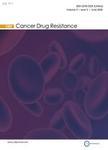Targeting the “undruggable” RAS - new strategies - new hope?
作者机构:Skin Cancer Unit of the Dermatology DepartmentMedical FacultyUniversity Duisburg-EssenWest German Cancer CenterEssen 45147Germany German Cancer Consortium(DKTK)partner site Düsseldorf/EssenEssen 45147Germany Biomolecular NMRFaculty of Chemistry and BiochemistryRuhr University of BochumBochum D-44780Germany
出 版 物:《Cancer Drug Resistance》 (癌症耐药(英文))
年 卷 期:2019年第2卷第3期
页 面:813-826页
学科分类:1002[医学-临床医学] 100214[医学-肿瘤学] 10[医学]
基 金:This work was partially supported by the European Fond for Regional Development(EFRD)(EFRE-0800951)to Mörchen B and Helfrich I (EFRE-0800947)to Shkura O and Stoll R
主 题:K-RAS small molecules immune checkpoints PD-1 PD-L1
摘 要:K-RAS is the most frequently mutated oncogene in solid tumors,such as pancreatic,colon or lung *** GTPase K-RAS can either be in an active(GTP-loaded)or inactive(GDP-loaded)*** its active form K-RAS forwards signals from growth factors,cytokines or hormones to the nucleus,regulating essential pathways,such as cell proliferation and *** turn,activating somatic mutations of this proto-oncogene deregulate the complex interplay between GAP(GTPase-activating)-and GEF(Guanine nucleotide exchange factor)-proteins,driving neoplastic *** to a rather shallow surface,K-RAS lacks proper binding pockets for small molecules,hindering drug development over the past thirty *** review summarizes recent progress in the development of low molecular antagonists and further shows insights of a newly described interaction between mutant K-RAS signaling and PD-L1 induced immunosuppression,giving new hope for future treatments of K-RAS mutated cancer.



